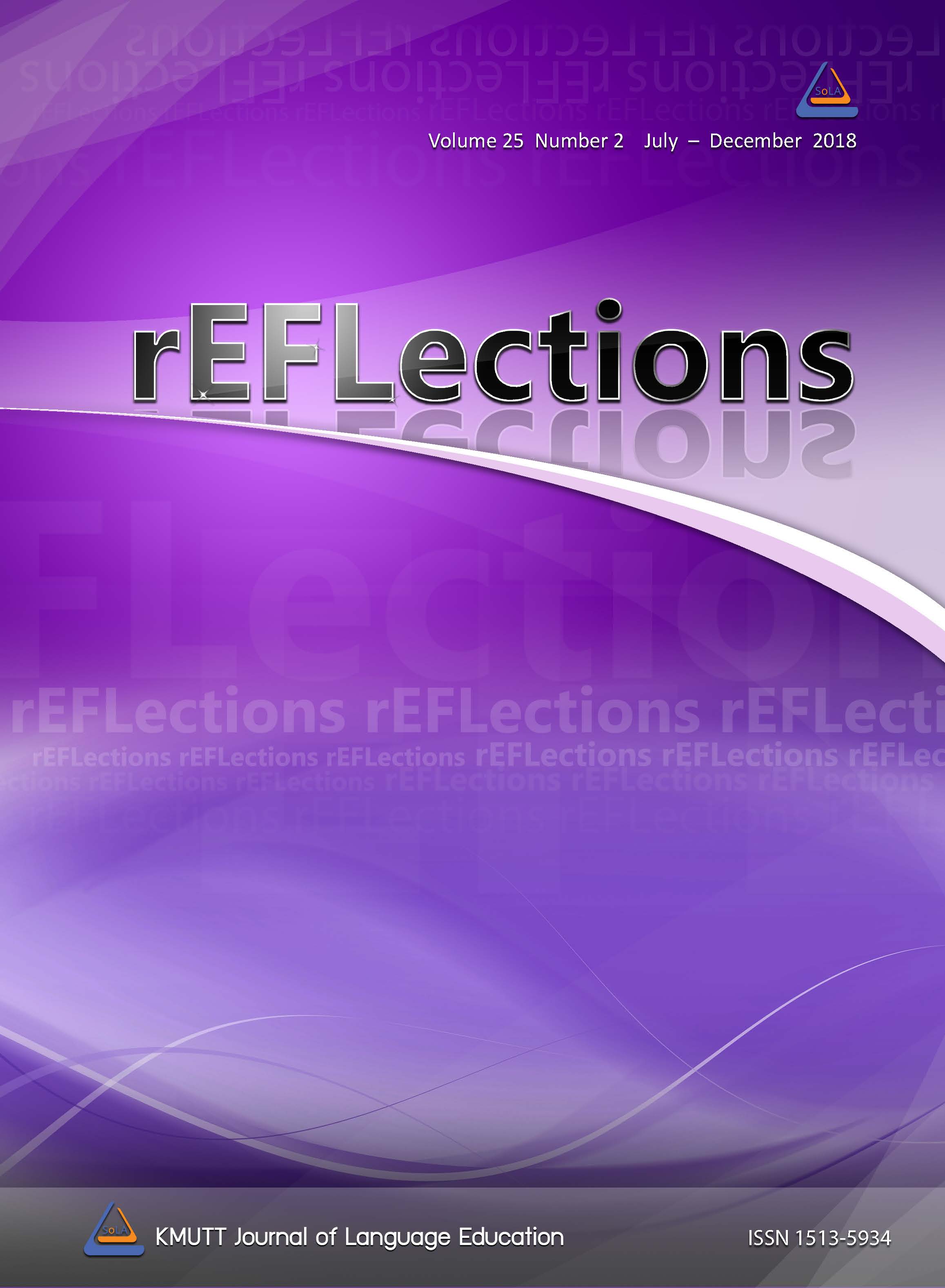Self-perception of English Proficiency of Thai Lower Secondary EFL Teachers
Main Article Content
Abstract
This study aims to examine self-perception of English proficiency of Thai teachers who teach English as a foreign language at the lower secondary level under the framework of the Common European Framework of References (CEFR). Moreover, the relationship between the teachers’ self-perception and their actual English proficiency was investigated. The respondents of the study were 123 Thai lower secondary teachers from 27 schools around Thailand. The design of this study was quantitative in nature. Thus, questionnaires were used as the key research instrument. The questionnaire items were designed based on the CEFR
framework and focused on descriptors of the A1 to B1 levels. The findings showed that Thai Lower Secondary EFL teachers had positive selfperception
towards their English proficiency. Moreover, there was a slight relationship between their self-perception and their English proficiency using the CEFR levels.
Article Details
References
Angelis, M., & Magana, C. (2017). Education in Thailand vs. the United States. Retrieved from https://maytermth ailand.org/2017/05/12/education-in-thailand-v-s-u-s/
Atagi, R. (2011). Secondary teacher policy research in Asia: Secondary teachers in Thailand. Retrieved from http: //uis.unesco.org/sites/default/files/documents/secondary-teachers-in-thailandsecondary-teacher-policy-research-in-asia-2011-en.pdf
Baker, W. (2012). From cultural awareness to intercultural awareness: Culture in ELT. ELT Journal, 66(1), 62-70.
Barcelos, A. M. F. (2003). Researching beliefs about SLA: A critical review. In P. Kalaja & A. M. F. Barcelos (Eds.), Beliefs about SLA: New research approaches (pp.7-33). Dordrecht, the Netherland: Kluwer Academic Publishers.
Boone, M. E. (2001). Managing interactively: Executing business strategy, improving communication, and creating a knowledge-sharing culture. New York, NY: McGraw-Hill.
Cambridge University Press. (2013). Introductory guide to the Common European Framework of Reference (CEFR) for English language teachers. Retrieved from http://www.englishprofile.org/images/pdf/ GuideToCEFR.pdf
Choi, S. J., (2007). The experiences of non-native English speaking teachers and their professional identity constructions in an ESL context. Retrieved from https://searchproquestcomopenview/a668ef6cd dda5fb012ce7977b14cfd52/1?pq-origsite=gscholar&cbl=18750&diss=y
Darasawang, P. (2007). English language teaching and education in Thailand: A decade of change. Retrieved from https://www.researchgate.net/publication/258431804_English_Language_Teaching_and_Education_in_Thailand_A_Decade_of_Change
Draper, D., & Kamnuansilpa, P. (2015). Thailand and the Common European Framework of Reference for Languages (CEFR): Education link-up with Cambridge must be genuine partnership. Retrieved from http://www.nationmultimedia.com/opinion/Education-link-up-with-Cambridge-mustbe-genuine-p-3027 1644.html
Eslami, R. Z., & Fatahi, A. (2008). Teachers' sense of self-efficacy, English proficiency, and instructional strategies: A study of nonnative EFL teachers in Iran. Teaching English as a second or foreign language, 11(4), 1-19.
Fredrickson, T. (2016). Asean community challenges Thai English skills. Retrieved from http://www.bangkokpost. com/learning/learning-news/813852/asean-community- challenges-thai-englishskills
Ghasemboland, F., & Hashim, B. F. (2013). Teachers’ self-efficacy beliefs and their English language proficiency: A study of nonnative EFL teachers in selected language centers. Procedie-Social and Behavioral Sciences, 103, 890-899. doi:10.1016/j.sbspro.2013.10.411
Graddol, D. (2006). English next: Why global English may mean the end of English as a Foreign Language. The British Council. Retrieved from http://vigdis.hi.is/sites/vigdis.hi.is/files/images/einangrun_enskumaelandi_ folks.pdf
Grossman, P. L., Reynolds, J. A., Ringstaff, C., & Sykes, G. (1985). From English major to English teacher: New approaches to an old problem (Knowledge growth in a profession series). Stanford, CA: Stanford University School of Education.
Hayes, D. (2010). Language learning, teaching and educational reform in rural Thailand: an English teacher’s perspective. Asia Pacific Journal of Education, 30(3), 305-319.
Jia, Y., (2004). English as a second language teachers’ perceptions and use of classroom- based reading assessment (Doctoral dissertation). Texas A&M University. Retrieved from http://citeseerx.ist.psu. edu/viewdoc/download?doi=10.1.1.117.2184&rep=rep1&type=pdf
Kitjaroonchai, N. (2013). Primary and lower secondary school teachers’ attitudes toward English language learning: A case study of teachers in Muak Lek and Wang Muang districts, Saraburi province. Catalyst, 8(1), 49-68.
Lee, M., Schutz, A. P., & Vlack, S. (2015). Non-native English-speaking teachers’ anxieties and insecurities: Self-perceptions of their communicative limitations. In M. Agudo & J. D. Dios (Eds.), Native and non-native teacher in English language classroom (pp.119-138). Berlin, Germany: De Gruyter.
Manz, C. C., & Sims, Jr., H. P. (2001). The new superleadership: Leading others to lead themselves. San Francisco, CA: Berrett-Koehler Publishers.
Maxwell, D. (2015). Thai schools adopt European framework to boost English language proficiency. Retrieved from https://asiancorrespondent.com/2015/ 04/ thai-schools-adopt-europeanframework-to-boost-english -language-proficiency/#ByeUrKleFMVekkVo.97
Moloi, L. (2009). Exploring the perceptions of English second language teachers about learner self-assessment in the secondary school. University of Pretoria. Retrieved from https://repository.up.ac.za/bitstream /handle/2263/27828/dissertation.pdf?sequence=1
Moussu, L., & Llurda, E. (2008). Non-native English-speaking English language teachers: History and research. Language Teaching, 41(3), 315–348.
Noom-ura, S. (2013). English Teaching problems in Thailand and Thai teachers’ professional development needs. English Language Teaching, 6(11), 139-147.
Odanga, S., Raburu, P., & Aloka, P. (2015). Influence of gender on teachers’ self-efficacy in secondary schools of Kisumu County, Kenya. Academic Journal of Interdisciplinary Studies MCSER Publishing, Rome-Italy, 4(3), 189-198.
Srakang, L., & Jansem, A. (2014). A Study of teachers’ perceptions toward using English textbooks: A case study of 10th grade English teachers in Maha Sarakham province. Srinakharinwirot University, Thailand.
Tang, T. (2007). Investigating NNS English teachers’ self-assessed language proficiency in an EFL context (Master's thesis). Retrieved from http://digitool.library.mcgill.ca/webclient/StreamGate?folder_id =0&dvs=1515245658261~391
The Nation. (2015). English teachers face test. Retrieved from http://www.nationmultimedia.com/news/nation al/aec/30255137
Moalosi. S, & Forcheh, N. (2015) Self-Efficacy Levels and Gender Differentials among Teacher Trainees in Colleges of Education in Botswana. Journal of Education and Learning, 4(3), 1-13.
Yamane, T. (1973). Statistics: An introductory analysis. New York, NY: Harper and Row Publication.
Yu, G. (2004). Perception, practice and progress-significance of scaffolding and zone of proximal development for second or foreign language teachers. Asian EFL Journal, 6(4), 1-24.


